
|
100 lei 2014 - Dumitru Matcovschi |
|
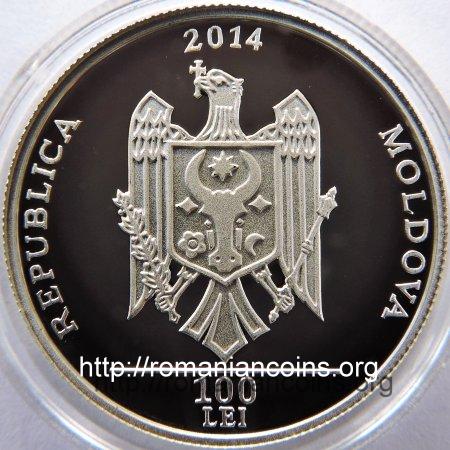
|
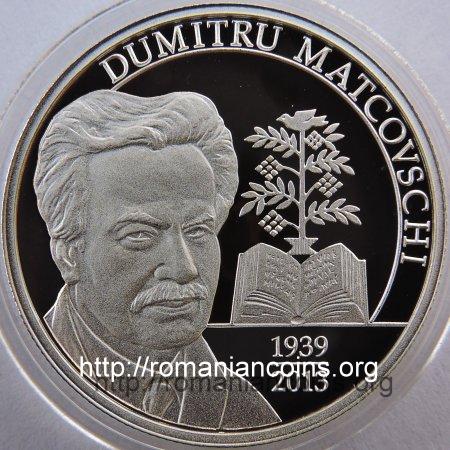
|
|
28 mm diameter, 13 g, 99.9% silver, grained edge year 2014, circular inscription REPUBLICA MOLDOVA meaning "REPUBLIC OF MOLDAVIA" and the coat of arms of the Republic of Moldavia, in exergue horizontal line and denomination "100 LEI" |
bust of the poet, an open book and an image of the tree of life, inscription DUMITRU MATCOVSCHI, years 1939 and 2013
Issuing date: 20th of October 2014 Mintage: 1000 coins |
The coin belongs to Personalities series.
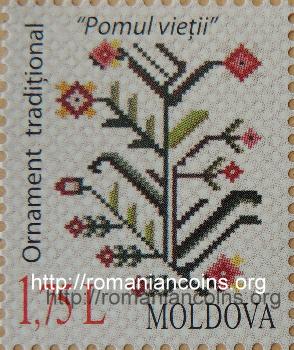
About the Image on the Coin
The image on the coin hints at the play "Pomul Vieții" [Tree of Life] (1977) by Dumitru Matcovschi. The tree of life is a Romanian decorative motive encountered also in Basarabia.
About Dumitru Matcovschi
Dumitru Matcovschi was born in 1939, in a village on the banks of River Nistru, Vadul Rașcov, in the county of Soroca, Romania. He is, as restated by the coins's certificate of authenticity also, an emblematic personality of the National Liberation (and National Rebirth) Movement in Basarabia.
Matcovschi wrote mainly poetry, but prose also and drama. At their time, Matcovschi's writings kept awake the feeling of belonging to the Romanian nation in the souls of his fellow nationals from the Soviet space, who at the time were politically and culturally separated from the ones in the Motherland. The value of his message brought up the attention of Soviet censorship, which forbade the poetry volume "Descîntece de alb și negru" [Disenchantments of White and Black] (1969), volume considered, immediately after the issue, as being subversive.
Accident in 1989
In order to understand the importance of the role had by Dumitru Matcovschi in the struggle for national rebirth, it is relevant to mention the accident suffered by him in May 1989, a period of intense engagement, during which Frontul Popular din Moldova [People's Front of Moldavia] was being created: a civic form, with political edge also, of organizing the struggle of the Romanians in Basarabia. The Writers' Union of Moldavia was implied as well, hosting the Founding Congress to the Front.
Subsequently to the accident, Dumitru Matcovschi was subjected to a series of surgical operations on the brain; he stayed in deep coma for about half a year, being one step away from death. He has never fully recovered after the accident. The perpetrators of the driving accident - considered by most to be an assassination attempt - were never found.
Shortly after the death of Matcovschi, the president of Writers' Union of Moldavia, Arcadie Suceveanu, publicly expressed the opinion that the accident, at the time, had a coagulation and catalysation effect on the fellow nationals: "The drama he himself endured in 1989, this tragic event has energized the masses, has polarized around his name the entire Romanian kin. Thence he became a true hero of the nation, a symbol of dignity and courage [...] [2].
Thus, a series of unexplained accidents has begun, all of great gravity and stern in aftermaths, aimed at the exponents of Romanian culture in Basarabia, professing its returning to the Motherland, Romania. The spouses Doina and Ion Aldea Teodorovici died during the night of 29th toward 30th of October 1992, close to the village of Coșereni in the Ialomița county, due to a road accident after which both the driver and another fellow traveller escaped uscathed. The great poet Grigore Vieru died also due to a road accident which occured in the night of 15th toward 16th of January 2009 close to the village of Dănceni in the raion of Ialoveni.
In poem "Pentru ea" [For Her], dedicated to the Romanian language by Grigore Vieru, a poem of great courage for the period when it was written and published, that is the Soviet times, a suggestion was made to the attempt on the life of the other courageous poet, Dumitru Matcovschi:
|
"Dumnezeu prima oară Cînd a plîns printre astre, El a plîns peste țară Cu lacrima limbii noastre. Pentru ea noi văruim pereții, Pentru ea mai sînt răniți poeții, Pentru ea cresc florile visării - Pentru limba țării.". |
"God, for the first time When he wept among the stars, He wept over the country With the tear of our language. For her we paint the walls, For her, still, poets get hurt, For her the flowers of dream are growing - For the language of the country.". |
Poem "Pentru ea" was first published on August 24th 1989 in the periodical "Literatura și Arta" [Literature and Art] and was sung for the first time by Doina and Ion Aldea-Teodorovici on August 27th 1989 (day surnamed as the "day which will light a century"), at the Great National Assembly at Chișinău, where a crowd of several hundred thousands have demanded the instauration of the natives' language as official language.
Dumitru Matcovschi about Romania and the Romanian Language
In an interview from 2012, Matcovschi stated for newspaper "Cuvântul" [Word] in Orhei that "... the Basarabian ever was Moldavian at Nistru and Romanian at Prut, our language was and is the Romanian language, our country, our Motherland, was and is Romania, [...], let us speak the mother's language, let us honour the ancient custom, let us believe in one God, not in bezbozhniks [atheists, god-less, in Russian] [1].
Officer of the "Cultural Merit" Order of Romania
For his cultural struggle in the service of the Romanian language, the president of Romania conferred to Dumitru Matcovschi the "Cultural Merit Order in rank of great officer. The festivity, organized by the Department for Romanians Everywhere [Departamentul pentru Românii de Pretutindeni], in partnership with the Romanian Cultural Institute "Mihai Eminescu" in Chișinău, took place on April 25th 2012, in the opening of poetry festival "European Spring of the Poets 2012".
National Funerals
Dumitru Matcovschi was burried with military honours in his birth village, Vadul Rașcov, the day being declared national day of mourning in the Republic of Moldavia (June 29th 2013). In the Republic of Moldavia, year 2014 was declared as "Year Dumitru Matcovschi" by the Parliament.
Poem "Basarabia"
One of his best known poems, enjoying a valuable musical interpretation thanks to artists Gheorghe Țopa, Lidia Botezatu and Radu Dolgan, notorious now but even more in the years of National Rebirth from beyond River Prut, is the one named Basarabia:
|
BASARABIA La margine de lume, venit din vremi bătrâne, un plai cu dulce nume înălțător rămîne. Aici o vatră sfîntă la sînul ei ne strînge și doina cînd se cîntă o lume toată plînge.
Ne încălzește lutul, ne-alină două ape, pătimitor trecutul într-un oftat încape. O iarbă-nrourată ascunde veche rană, ni-i soarta zbuciumată, oricînd basarabeană.
Avem un nuc și-i verde, și-n pragul casei crește, cu nucul nu ne pierdem, de moarte ne păzește. La prunci sîntem cu gîndul și nu dorim războaie, noi semănăm pămîntul și așteptăm o ploaie.
Basarabia, Basarabia, frate și soră, mamă și tată, Basarabia, Basarabia, scumpă icoană în inimi purtată.
Trecută prin foc și prin sabie, furată, trădată mereu, ești floare de dor, Basarabie, ești lacrima neamului meu. (19 noiembrie 1986)
|
BASARABIA At the edge of the world, issued out of olden days, a land with sweet name remains uplifting. Here a holy hearth unites us at her breast and when a doina [Romanian ballad] is sung an entire world weeps.
The clay gives us warmth, two waters are soothing us, aching the past fits inside a sigh. Dew covered grass covers an old wound, our fate is troubled and always Basarabian.
We have a walnut tree and it's green, on house's threshold it grows, together with the walnut tree we shall not get lost, it guards us from death. Our thought is on children we do not want wars, we sow the earth and wait for the rain.
Basarabia, Basarabia, brother and sister, mother and father, Basarabia, Basarabia, dear icon borne inside hearts. Thrusted through fire and sword, stolen, betrayed time and again, you, Basarabia, are a flower of yearning your are the tear of my people. (19th of November 1986) |
The bust of the poet was added to the Alley of Classics in Chișinău in 2019, sculptors being Victor Macovei and Ruslan Tihonciuc. Inline image
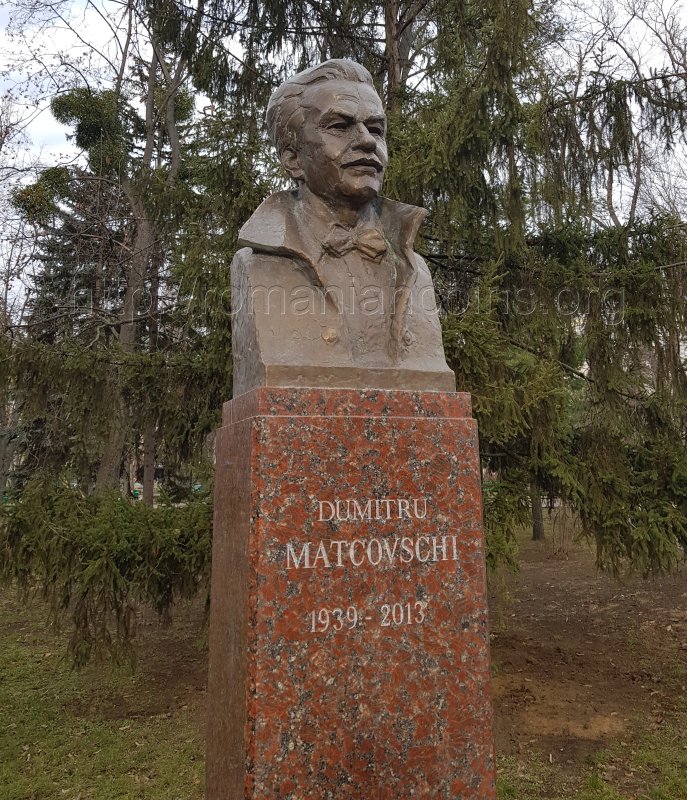
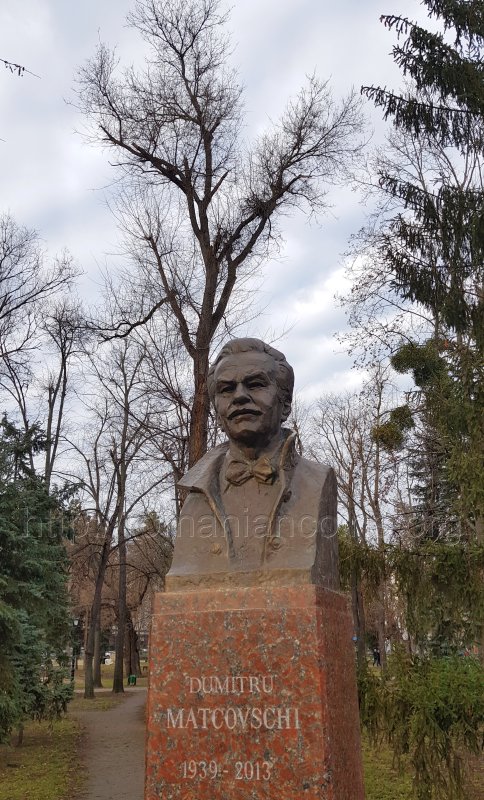
References
1. Iașcenco T., Dumitru Matcovschi: Viața este o luptă, cea mai grea din toate, interviu cu Dumitru Matcovschi publicat în anul 2012 în săptămînalul Cuvântul din Orhei.
2. Ionescu Gabriela., Moartea lui Dumitru Matcovschi - o pierdere imensă pentru cultura și literatura românească Corespondență din 27 iunie 2013 publicată de Agenția Națională de Presă AGERPRES.
|
Back to selection page!
|